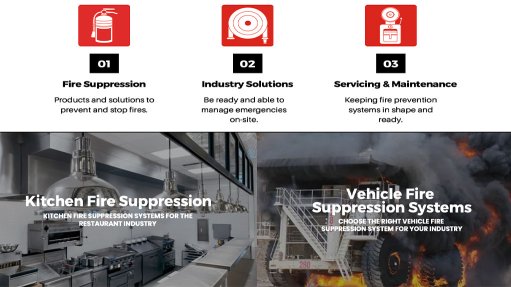Solar can alleviate universities’ power woes
This article has been supplied.
With industrial outputs declining and food production and security coming under threat, it could be easy to overlook the impact that loadshedding has on universities and other institutions of higher learning. However, to do that would be to deny the ramifications of power interruptions have on our country’s current, and especially future, ability to meet the needs of the labour market and advance innovation and the economy.
Loadshedding disrupts all aspects of an academic institution’s operations. Teaching and learning interruptions delay academic progress, making it difficult for students and faculty alike to adhere to the academic calendar. Research activities are severely impacted as researchers may lose critical data if experiments or data collection processes are interrupted at crucial moments. The resultant delays can negatively affect funding and publication opportunities. In both instances, the reputational damage associated with the non-delivery of academic outputs is significant.
Administrative functions also suffer, complicating the delivery of services such as online registration and the electronic processing of academic records. In residences, students are left without light at which to study, and basic amenities in the form of cooked meals, functioning bathrooms and laundry services.
Many universities have already invested in expensive backup generators that add hundreds of thousands of rands to everyday running costs and/or alternative power sources to mitigate these impacts. During the Portfolio Committee on Higher Education, Science and Innovation meeting held on 13 March this year, Minister Blade Nzimande reported that the University of Pretoria (UP) spends more than R1,2 million per day on diesel to run the generators that keep its campuses functioning. This is despite the fact that two of its campuses are close enough to hospitals to not be affected by loadshedding. While UP is a clear outlier as far as costs are concerned (the University of Cape Town spends R98 500 per day), it at least has the means to buy back-up power. The University of Zululand, by contrast, reported a lack of generators, leaving its students with few options.
One of the most important amenities within any student residence environment is the hot water required for ablution and laundry facilities. And while photovoltaics with battery back-up can alleviate some of the above electrical and lighting issues it is not practical for providing reliable hot water to high density accommodation, like in student residences. The positive news is that solutions are available to address this need.
A notable example is the Wits Junction district heating project installed in 2019 by the Southern African Solar Thermal Training and Demonstration Initiative (SOLTRAIN) and through its partners, the South African National Energy Development Institute (SANEDI) and the University of Stellenbosch.
The installation combines solar, co-generation and gas heating technologies to supply 1 103 students living in 14 student residence buildings with hot water from one centralised plant room. The 600 m2 solar-heating plant with its 10 m2 Austrian collectors meets the district’s entire hot water demand, amounting to an average of 94 000 litres per day, and 60 000L of hot water storage. Since the system was commissioned, hot-water- related complaints have reduced by 98%, while the university is set to save an estimated R40 million over the next 20 years. The system showcases an impressive solar peak performance of 420 kWth and is expected to realise a CO2 reduction of 1 950 ton (based on a 25-year lifetime). After less than a year of system operation (August 2018 – May 2019) more than R1 million had been saved and this continues today, meaning that the return on the system investment over its lifetime can roughly be calculated at 160%.
According to Dr Karen Surridge, Renewables and Fossil Fuel Project Manager from SANEDI, South Africa is blessed with an impressive solar resource allowing solar solutions to be used across the spectrum to support energy security. Not least of these is to maintain teaching, research and admin functions and institutes of learning during challenging times loadshedding. “The sun provides us with two energy sources, heat and light, and in South Africa we are lucky to have an abundance of it across the country” says Surridge. “Why not use the heat directly and the light for electricity to support some of the load during loadshedding?” However, it is important to remember that while the sun is free the technology to harness it is not, so understanding the business cases behind building solar (heat or electrical) installations is paramount to making a good investment. “Weigh up the cost in rands and cents of course! But also consider the prospect of energy security, that can be ‘priceless’” concludes Surridge.
Article Enquiry
Email Article
Save Article
Feedback
To advertise email advertising@creamermedia.co.za or click here
Comments
Press Office
Announcements
What's On
Subscribe to improve your user experience...
Option 1 (equivalent of R125 a month):
Receive a weekly copy of Creamer Media's Engineering News & Mining Weekly magazine
(print copy for those in South Africa and e-magazine for those outside of South Africa)
Receive daily email newsletters
Access to full search results
Access archive of magazine back copies
Access to Projects in Progress
Access to ONE Research Report of your choice in PDF format
Option 2 (equivalent of R375 a month):
All benefits from Option 1
PLUS
Access to Creamer Media's Research Channel Africa for ALL Research Reports, in PDF format, on various industrial and mining sectors
including Electricity; Water; Energy Transition; Hydrogen; Roads, Rail and Ports; Coal; Gold; Platinum; Battery Metals; etc.
Already a subscriber?
Forgotten your password?
Receive weekly copy of Creamer Media's Engineering News & Mining Weekly magazine (print copy for those in South Africa and e-magazine for those outside of South Africa)
➕
Recieve daily email newsletters
➕
Access to full search results
➕
Access archive of magazine back copies
➕
Access to Projects in Progress
➕
Access to ONE Research Report of your choice in PDF format
RESEARCH CHANNEL AFRICA
R4500 (equivalent of R375 a month)
SUBSCRIBEAll benefits from Option 1
➕
Access to Creamer Media's Research Channel Africa for ALL Research Reports on various industrial and mining sectors, in PDF format, including on:
Electricity
➕
Water
➕
Energy Transition
➕
Hydrogen
➕
Roads, Rail and Ports
➕
Coal
➕
Gold
➕
Platinum
➕
Battery Metals
➕
etc.
Receive all benefits from Option 1 or Option 2 delivered to numerous people at your company
➕
Multiple User names and Passwords for simultaneous log-ins
➕
Intranet integration access to all in your organisation

















